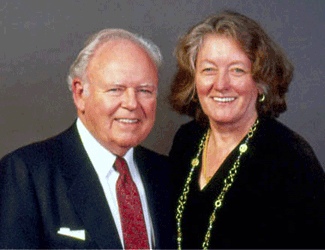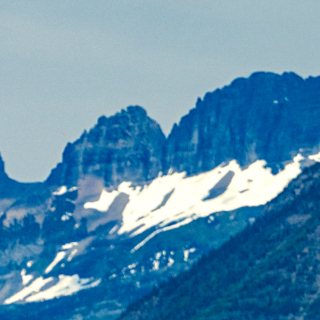Center History
The O’Connor Center for the Rocky Mountain West was formally established by the Montana University System Board of Regents in 1992 as a forum to explore, examine, and articulate an inclusive regional identity and vision using a variety of disciplines. The very first gift received by the Center as it was being conceived was a gift by the William O’Neill Family Foundation of Oregon – an endowment gift of $600,000 to encourage and enhance western regional history studies at the University of Montana.
In the mid-90s a Challenge Grant from the National Endowment for the Humanities (NEH) was secured and received, a $520,000 core grant that was subsequently matched $3-to-$1 over a four-year period, bringing the total NEH grant and match to over $2 million. Carroll and Nancy Fields O’Connor, both graduates of the University of Montana, provided the single largest gift toward this NEH match of $1 million. In recognition of this, the Center was named for them.
 |
The Center is named for Carroll and Nancy Fields O’Connor, both University of Montana graduates, who provided the largest gift toward the Center’s NEH Challenge Grant match. Carroll had an M.A. in speech and communications from UM (1956), while Nancy had a bachelor’s degree in English and drama (1951). Carroll died in 2001 shortly after returning to UM to teach a popular class entitled “Writing the Movie.” Nancy, a Montana native with Crow Indian heritage, died in 2014 in Los Angeles. In her later years she worked to find and reassemble her grandfather’s collection of over 600 historic photographs of the Crow Indians from 1895 to 1920; the Fred E. Miller Collection. Nancy’s brother, John Fields, is a former Bureau of Land Management staffer and member of the O’Connor Center advisory board. |
Several others provided major gifts toward meeting the Center’s NEH challenge grant matching requirement. This included a gift of nearly $148,000 by James and Christine Scott of Billings and the Scott-affiliated Foundation for Community Vitality (FCV) and gift in excess of $100,000 by Norman Creighton, a UM alum and former executive with Imperial Bank. James and Frances Jorgensen Wylder of Great Falls also have made a pledge of $250,000 to the Center as part of their will.
Chris and Jim Scott and their FCV also provided additional gifts to the Center totaling over $760,000 in the form of First Interstate Bank stock. In 2011 after their fourth and largest gift the Scott’s directed these to establish a dedicated endowment fund for the James and Chris Scott Senior Fellow in Regional Economy. This Scott Family endowment fund has now grown in value to over $1.8 million. Total endowment funding for the Center grew to over $4.5 million in 2016.
SCOTTS photo (to be inserted later)
The Center’s endowed Senior Fellow in Regional Economy position was created from gifts provided by James and Chris Scott and the Scott-affiliated Foundation for Community Vitality. Jim Scott is the son of Homer and Mildred Scott, founders of First Interstate Bank, initially with a single bank in Sheridan, WY. FIB is now one of the largest regional banks in the U.S. with facilities in Montana, Wyoming, South Dakota, Idaho, Oregon, and Washington. The Scott’s are longstanding supporters of higher education in Montana and Wyoming and have nurtured and supported many local and regional initiatives in community development, social capital, Native American affairs, land and resource conservation, and public education. Chris has served on the national board of the Nature Conservancy.
The Center’s initial programs were in regional history and in the humanities more generally focused on Montana and the U.S. Northern Rockies. Early program initiatives included conferences like “Montanans New and Old” and “A. B. Guthrie’s The Big Sky – After 50 Years.” The geographic scope of the Center expanded to include a larger trans-national region of the U.S. and Canada, centered over the North American Rocky Mountains.
During the ‘90s this region had been experiencing fast population growth and had one of the fastest growing and changing economies in North America. The North American Free Trade Agreement was adopted, adding more focus to the trans-border economy and relations. This prompted the Center to add programming for ongoing research and study of this larger region’s economy and the geographic scope of Center work expanded to include the larger trans-national region of the U.S. and Canada, centered over the North American Rocky Mountains.
Center programming expanded further in the late ‘90s when it established an ongoing regional news service called Headwaters News. This web-based news aggregation and redistribution service involved daily and weekly production of summaries of the region’s most important news stories gathered from newspapers and other publications throughout the region. The name of this news service eventually was changed to Mountain West News. The Center has developed an ongoing program in regional journalism, adding a radio program called Mountain West Voices, with new programs produced and aired weekly on Montana Public Radio.
